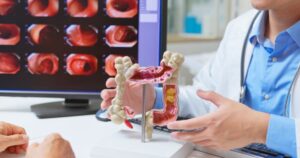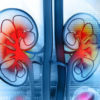 The digestive system plays an important role in the body. It breaks down food, absorbs nutrients, and ensures waste products safely leave the body. Bergen Medical Associates is a leader in gastroenterology care in northern New Jersey, providing treatment for a wide variety of digestive conditions. Learn more about digestive system anatomy and the conditions we treat.
The digestive system plays an important role in the body. It breaks down food, absorbs nutrients, and ensures waste products safely leave the body. Bergen Medical Associates is a leader in gastroenterology care in northern New Jersey, providing treatment for a wide variety of digestive conditions. Learn more about digestive system anatomy and the conditions we treat.
What Is the Digestive System?
The digestive system, also called the gastrointestinal system or GI system, is the body’s fuel system. It features a network of interconnected organs working together to process food and dispose of waste. They perform several crucial roles:
- Breaking down solid food and liquids
- Absorbing water and nutrients
- Passing food waste as stool
In accomplishing these tasks, the digestive system keeps the body fueled. The sugars, amino acids, fatty acids, and glycerol are used for energy, growth, and cell repair. The digestive system also ensures that waste products leave the body safely to maintain balance.
How Is the Digestive System Structured?
Digestion is a complex process that requires multiple organs to work together in harmony. Food moves from one to the next, making several stops as it is processed and converted to waste:
- Mouth: The mouth is where food enters the body. It also breaks down food with chewing and saliva, preparing it for later digestion.
- Esophagus: The esophagus transports food to the stomach with a series of contractions. This process, called peristalsis, is automatic.
- Esophageal sphincter: This is a tight ring of muscles at the bottom of the esophagus. It prevents food and stomach acid from moving back up into the esophagus.
- Stomach: This organ uses strong acids, enzymes, and a constant churning motion to complete the process of breaking down food to make nutrients more readily accessible.
- Small intestine: The small intestine mixes semisolid food with digestive juices from the pancreas and liver, further breaking it down. Nutrients are absorbed through the intestine walls.
- Large intestine: Food waste and undigested particles move into the large intestine, where moisture is absorbed to hydrate the body and convert waste into stool.
- Anus: This tight ring of muscles forms the bottom of the large intestine. It relaxes to pass stool during a bowel movement, helping waste safely leave the body.
- Pancreas: The pancreas produces pancreatic juice, which is used by the small intestine to break down carbohydrates and proteins.
- Liver: The liver produces bile, which is used by the small intestine to break down fat.
- Gallbladder: Bile is stored and concentrated in the gallbladder, making it more potent before it enters the small intestine.
If something goes wrong with even one of these organs, the entire system falters. Keeping each component healthy is vital to maintain a functioning digestive system and a healthy body.
What Is Gastroenterology?
Gastroenterology is a medical discipline focused on digestive system conditions. It studies how the system and organs function normally and how various diseases affect that function. Gastroenterologists use this knowledge to plan treatments for many different conditions related to digestion. Patients may visit a gastroenterologist if they are experiencing:
- Problems with digestion or bowel function
- Swallowing difficulties
- Abdominal pain
- Internal bleeding
- Illnesses affecting the gallbladder, pancreas, and liver
Gastroenterologists receive extensive training in their field. After medical school, they complete a three-year residency followed by a two- to three-year fellowship in gastroenterology, resulting in five or six years of specialized training before earning their board certification. This training is essential to provide accurate diagnoses, treatments, and management of gastroenterology conditions.
What Are Common Gastroenterology Conditions?
Bergen Medical Associates has expertise in treating a wide variety of gastroenterology conditions. We offer a full range of diagnostic services, including colonoscopy, endoscopy, and capsule endoscopy, to detect and develop personalized plans for the following:
Abdominal Pain
Abdominal pain, or stomach pain, is a common symptom of digestive system disorders. It may be caused by gas, inflammation, stress, or a serious underlying condition, such as an infection or obstruction. Most cases of abdominal pain should go away after a few hours or days. If abdominal pain does not go way or if it keeps returning, patients should contact a physician.
Acid Reflux
Acid reflux is better known as heartburn. This condition occurs when the esophageal sphincter does not contract properly, letting stomach acid flow upward into the esophagus. While occasional acid reflux is common, chronic acid reflux may lead to gastroesophageal reflux disease (GERD). If left untreated, GERD can cause serious conditions like esophagitis (esophagus inflammation) or cancer.
Barrett’s Esophagus
Barrett’s esophagus is a condition that occasionally results from chronic acid reflux or GERD. Over time, repeated exposure to stomach acid causes damage to tissues lining the inside of the esophagus. The cycle of damage and healing results in a thickening of the esophageal lining. Barrett’s esophagus may also make a patient more susceptible to esophageal cancer.
Colon Cancer
Colon cancer is one of the most common cancer types in the United States. This type of cancer develops in the colon, or the large intestine. It often develops from precancerous growths, called polyps. A DNA change causes cells in precancerous polyps to multiply out of control. This creates a growing mass of abnormal cells, called a tumor, that may infect other nearby tissues.
Constipation
Constipation occurs when stool moves too slowly through the colon. This results in slow, strained, and sometimes painful passage of stool. Nearly everybody experiences constipation at some point in their lives, and minor cases should go away within a few days. If constipation does not go away or keeps returning, however, it may indicate a serious underlying condition.
Diabetes
Diabetes is a chronic condition affecting millions of people across the country. It occurs when the pancreas fails to produce enough insulin to absorb glucose properly. As a result, muscles and tissues do not receive enough glucose to stay energized. The patient also maintains chronically high blood sugar levels, putting stress on the kidney to filter excess glucose.
Diarrhea
Diarrhea is the medical term for loose or watery stool. It is extremely common, and most cases are acute, lasting only a few days before going away on their own. If diarrhea lasts for more than a few weeks, however, it may lead to long-term complications such as dehydration or nutrient malabsorption. It also likely indicates a serious underlying issue with the GI system.
Dysphagia
Dysphagia refers to difficulty swallowing. It occurs when one or more parts of the mouth, throat, or esophagus do not work properly. It may be caused by a nerve disorder, muscle condition, or blockage. Most cases are mild and temporary. However, severe, long-term dysphagia is serious, as it may lead to complications such as lung infections, pneumonia, malnutrition, and weight loss.
Fatty Liver Disease
Fatty liver disease, also called hepatic steatosis, is a condition caused by fat buildup in the liver. While small amounts of liver fat are harmless, large quantities may cause scarring (cirrhosis) that permanently impacts the liver’s ability to function properly. It may also make a patient more vulnerable to serious conditions, including liver disease and liver cancer.
Gallbladder Disease
Gallbladder disease refers to any condition, such as gallbladder inflammation (cholecystitis), abscesses, or gallstones, that affect the gallbladder. Gallbladder diseases interfere with the production, storage, and movement of bile, and may affect other organs in the digestive system as well. If left untreated, gallbladder diseases may result in severe complications.
Gallstones
Gallstones are the most common cause of gallbladder problems. These form when the gallbladder has too much of a bile ingredient, usually cholesterol. The excess ingredient congeals into a hardened mass. Small gallstones pass without the patient ever noticing. Large ones, however, may cause bile duct blockages and potentially severe complications such as inflammation or tearing.
GERD
Gastroesophageal reflux disease (GERD) is the medical term for chronic acid reflux (heartburn). Acid reflux occurs when stomach acid flows upward into the esophagus, causing a burning sensation. Patients with GERD may experience this multiple times per week over several weeks. GERD is uncomfortable and, if left untreated, may result in other serious health conditions.
Hepatitis
Hepatitis refers to inflammation of the liver, which is most often caused by a viral infection. There are three types of hepatitis virus which vary in severity, some of which are preventable with vaccines. Other possible causes for liver inflammation include bacterial infections, long-term alcohol abuse, and autoimmune disorders. Hepatitis can lead to chronic liver disease if left untreated.
Hemorrhoids
Hemorrhoids are swollen blood vessels in the anal cushions or the specialized tissues that help the anus form a tight closure. When blood vessels in this zone become irritated, they may swell and bulge. Hemorrhoids may form on the inside or the outside of the anus. Some are asymptomatic, while others cause itchiness, pain, and even bleeding in the anus.
Hiatal Hernia
A hiatal hernia takes its name from the hiatus, a small opening in the diaphragm that assists with swallowing. A hernia occurs when part of the esophagus folds upward through the hiatus and then back down, or when the upper part of the stomach bulges through this opening. Small hernias cause no symptoms or discomfort, though larger ones may result in digestive issues.
Inflammatory Bowel Disease
Inflammatory bowel disease (IBD) is an umbrella term referring to several inflammatory conditions in the bowels. It includes Crohn’s disease, ulcerative colitis (colon ulcers), microscopic colitis, and others. Symptoms often come and go in intermittent waves or flare-ups. All forms of IBD are chronic and cannot be cured. Instead, treatment focuses on symptom management.
Irritable Bowel Syndrome
Irritable bowel syndrome (IBS) is a group of related symptoms affecting the digestive system. It is characterized by abdominal pain, cramps, frequent gas, and changes in bowel habits such as diarrhea or constipation. These symptoms go through cycles of flare-ups, which are often triggered by diet choices or stress. IBS is quite common, affecting a large percentage of the population.
Lactose Intolerance
Lactose intolerance occurs when the body does not produce lactase. This enzyme is responsible for breaking down lactose, a form of sugar found in most dairy products. Without enough lactase, the body cannot digest lactose-heavy foods. This results in symptoms of indigestion. Lactose intolerance is chronic and commonly develops in teenagers and young adults.
Rectal Cancer
Rectal cancer is a type of cancer that forms in the rectum, or the lowest portion of the large intestine. It is often referred to, alongside colon cancer, as colorectal cancer. Most cases of rectal cancer develop from abnormal growths in the rectum called polyps. When cells in these polyps begin to mutate and grow out of control, the result is a cancerous tumor.
Ulcer
An ulcer is an open sore in the digestive system. Ulcers may form in the lining of the stomach (gastric ulcers), small intestine (duodenal ulcers), or esophagus (esophageal ulcers). They have a wide variety of potential causes, including bacterial infections, stress, alcohol consumption, and certain medications. They tend to recur if not treated by a specialist.
What Treatments Do Gastroenterologists Provide?
Once their condition has been diagnosed, Bergen Medical Associates works with the patient to develop a treatment plan. All treatment plans are personalized based on the patient’s condition, overall health, and other needs. Approaches we may employ include:
- Nutrition: Many digestive conditions are caused or aggravated by certain foods. Our nutrition specialists can guide patients in making healthier dietary choices.
- Lifestyle changes: Physicians may recommend increased exercise, less alcohol consumption, and other lifestyle adjustments to treat or manage a health condition.
- Medication: A variety of prescription drugs, including antacids, hormone blockers, muscle relaxers, and more, can provide relief for uncomfortable symptoms.
- Antibiotics: Inflammation, ulcers, and other conditions are often caused by bacterial infections, which can be managed or eliminated with antibiotic medication.
- Surgery: Many persistent conditions may be treated with surgery. Our ambulatory surgical suite is the first Medicare-approved and federally certified in the state of New Jersey.
For over 25 years, Bergen Medical Associates has been one of our area’s leaders in comprehensive gastrointestinal care. Our facilities are equipped with state-of-the-art equipment, empowering us to offer a full range of diagnostic and treatment services. In addition, all Bergen Medical Associates practitioners are board-certified in gastroenterology. Patients can trust their care is in experienced hands.
Access Treatment for Digestive Diseases in Northern New Jersey
Patients struggling with abdominal pain, indigestion, bowel habit changes, and other symptoms of a digestive condition can find treatment at Bergen Medical Associates. We serve northern New Jersey from six convenient locations, offering state-of-the-art medical care for a wide variety of conditions. Contact us to learn more about digestive system anatomy and the diagnostic and treatment services we offer. We have locations in Emerson, Montvale, Northvale, Paramus, and Ridgewood, NJ, making it easy to find treatment near you.












